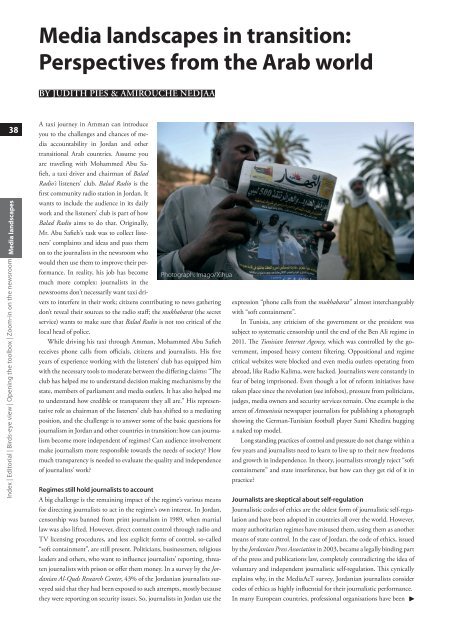MediaAcT
How fragile is media credibility? Accountability and transparency in journalism: research, debates, perspectives Final Research Report | Media Accountability and Transparency in Europe
How fragile is media credibility? Accountability and transparency in journalism: research, debates, perspectives
Final Research Report | Media Accountability and Transparency in Europe
Create successful ePaper yourself
Turn your PDF publications into a flip-book with our unique Google optimized e-Paper software.
Index | Editorial | Birds-eye view | Opening the toolbox | Zoom-in on the newsroom | Media landscapes<br />
Media landscapes in transition:<br />
Perspectives from the Arab world<br />
By JudiTh pieS & AMirOuche nedJAA<br />
A taxi journey in Amman can introduce<br />
you to the challenges and chances of media<br />
accountability in Jordan and other<br />
transitional Arab countries. Assume you<br />
are traveling with Mohammed Abu Safieh,<br />
a taxi driver and chairman of Balad<br />
Radio’s listeners’ club. Balad Radio is the<br />
first community radio station in Jordan. It<br />
wants to include the audience in its daily<br />
work and the listeners’ club is part of how<br />
Balad Radio aims to do that. Originally,<br />
Mr. Abu Safieh’s task was to collect listeners’<br />
complaints and ideas and pass them<br />
on to the journalists in the newsroom who<br />
would then use them to improve their performance.<br />
In reality, his job has become Photograph: Imago/Xihua<br />
much more complex: journalists in the<br />
newsrooms don’t necessarily want taxi drivers<br />
to interfere in their work; citizens contributing to news gathering expression “phone calls from the mukhabarat” almost interchangeably<br />
don’t reveal their sources to the radio staff; the mukhabarat (the secret with “soft containment”.<br />
service) wants to make sure that Balad Radio is not too critical of the In Tunisia, any criticism of the government or the president was<br />
local head of police.<br />
subject to systematic censorship until the end of the Ben Ali regime in<br />
While driving his taxi through Amman, Mohammed Abu Safieh 2011. The Tunisian Internet Agency, which was controlled by the go-<br />
receives phone calls from officials, citizens and journalists. His five vernment, imposed heavy content filtering. Oppositional and regime<br />
years of experience working with the listeners’ club has equipped him critical websites were blocked and even media outlets operating from<br />
with the necessary tools to moderate between the differing claims: “The abroad, like Radio Kalima, were hacked. Journalists were constantly in<br />
club has helped me to understand decision making mechanisms by the fear of being imprisoned. Even though a lot of reform initiatives have<br />
state, members of parliament and media outlets. It has also helped me taken place since the revolution (see infobox), pressure from politicians,<br />
to understand how credible or transparent they all are.” His represen- judges, media owners and security services remain. One example is the<br />
tative role as chairman of the listeners’ club has shifted to a mediating arrest of Attounissia newspaper journalists for publishing a photograph<br />
position, and the challenge is to answer some of the basic questions for showing the German-Tunisian football player Sami Khedira hugging<br />
journalism in Jordan and other countries in transition: how can journa- a naked top model.<br />
lism become more independent of regimes? Can audience involvement Long standing practices of control and pressure do not change within a<br />
make journalism more responsible towards the needs of society? How few years and journalists need to learn to live up to their new freedoms<br />
much transparency is needed to evaluate the quality and independence and growth in independence. In theory, journalists strongly reject “soft<br />
of journalists’ work?<br />
containment” and state interference, but how can they get rid of it in<br />
practice?<br />
Regimes still hold journalists to account<br />
A big challenge is the remaining impact of the regime’s various means<br />
for directing journalists to act in the regime’s own interest. In Jordan,<br />
censorship was banned from print journalism in 1989, when martial<br />
law was also lifted. However, direct content control through radio and<br />
TV licensing procedures, and less explicit forms of control, so-called<br />
“soft containment”, are still present. Politicians, businessmen, religious<br />
leaders and others, who want to influence journalists’ reporting, threaten<br />
journalists with prison or offer them money. In a survey by the Jordanian<br />
Al-Quds Research Center, 43% of the Jordanian journalists surveyed<br />
said that they had been exposed to such attempts, mostly because<br />
they were reporting on security issues. So, journalists in Jordan use the<br />
Journalists are skeptical about self-regulation<br />
Journalistic codes of ethics are the oldest form of journalistic self-regulation<br />
and have been adopted in countries all over the world. However,<br />
many authoritarian regimes have misused them, using them as another<br />
means of state control. In the case of Jordan, the code of ethics, issued<br />
by the Jordanian Press Association in 2003, became a legally binding part<br />
of the press and publications law, completely contradicting the idea of<br />
voluntary and independent journalistic self-regulation. This cynically<br />
explains why, in the <strong>MediaAcT</strong> survey, Jordanian journalists consider<br />
codes of ethics as highly influential for their journalistic performance.<br />
In many European countries, professional organisations have been


